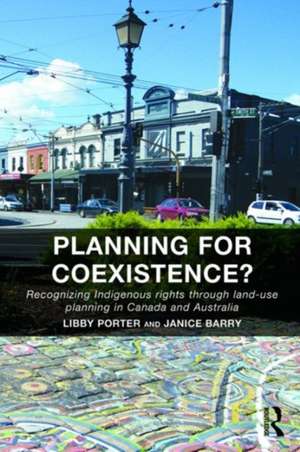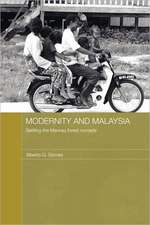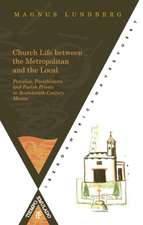Planning for Coexistence?: Recognizing Indigenous rights through land-use planning in Canada and Australia
Autor Libby Porter, Janice Barryen Limba Engleză Hardback – 13 iun 2016
| Toate formatele și edițiile | Preț | Express |
|---|---|---|
| Paperback (1) | 432.29 lei 6-8 săpt. | |
| Taylor & Francis – 12 feb 2018 | 432.29 lei 6-8 săpt. | |
| Hardback (1) | 1055.51 lei 6-8 săpt. | |
| Taylor & Francis – 13 iun 2016 | 1055.51 lei 6-8 săpt. |
Preț: 1055.51 lei
Preț vechi: 1287.22 lei
-18% Nou
Puncte Express: 1583
Preț estimativ în valută:
201.99€ • 219.34$ • 169.68£
201.99€ • 219.34$ • 169.68£
Carte tipărită la comandă
Livrare economică 22 aprilie-06 mai
Preluare comenzi: 021 569.72.76
Specificații
ISBN-13: 9781409470779
ISBN-10: 1409470776
Pagini: 232
Ilustrații: 13
Dimensiuni: 156 x 234 x 18 mm
Greutate: 0.48 kg
Ediția:1
Editura: Taylor & Francis
Colecția Routledge
Locul publicării:Oxford, United Kingdom
ISBN-10: 1409470776
Pagini: 232
Ilustrații: 13
Dimensiuni: 156 x 234 x 18 mm
Greutate: 0.48 kg
Ediția:1
Editura: Taylor & Francis
Colecția Routledge
Locul publicării:Oxford, United Kingdom
Cuprins
1. Introduction: The Challenge of Indigenous Coexistence for Planning, Part I Concepts and Contexts, 2. ‘We Are All Here to Stay’: A ‘Meditation on Discomfort’, 3. Seeing the Contact Zone: A Methodology for Analyzing Links between Everyday and Textual Practice, 4. Constructing Contact Zones: Planning and Recognition Discourses in Victoria and British Columbia, Part II Stories of Planning in (Post) Colonial Victoria and British Columbia, 5. The Non-Recognition of Indigenous Rights in Metropolitan Melbourne, 6. Negotiating Bounded Recognition: Seeking Co-management on the River Red Gum Flood Plains, 7. Neighbour-to-Neighbour Planning Relations along Vancouver’s North Shore, 8. Planning for Wilp Sustainability in the Nass and Skeena River Watersheds, Part III Conceptualizing Coexistence in Planning Theory and Practice, 9. Negotiating, Contesting, Reframing: Indigenous Agency in the Contact Zone, 10. Bounded Recognition: How Planning Resettles Indigenous Claims, 11. Developing Intercultural Capacity: Lessons for Planning Practice, 12. Towards Coexistence: Rethinking Planning for Indigenous Justice
Notă biografică
Libby Porter is Associate Professor at the Centre for Urban Research, at RMIT University (Melbourne, Australia). Her research is about the complicity of planning in dispossession and displacement, especially of Indigenous peoples in settler-colonial states, and also of disadvantaged communities through urban regeneration policies and mega-events.
Janice Barry is an Assistant Professor in the Department of City Planning at the University of Manitoba (Winnipeg, Canada). Her research explores the tensions between more collaborative forms of land use decision-making and larger institutional structures and discourses, and Indigenous peoples' experiences of state-directed planning. She also coordinates a service-based learning partnership with several Manitoba First Nations.
Janice Barry is an Assistant Professor in the Department of City Planning at the University of Manitoba (Winnipeg, Canada). Her research explores the tensions between more collaborative forms of land use decision-making and larger institutional structures and discourses, and Indigenous peoples' experiences of state-directed planning. She also coordinates a service-based learning partnership with several Manitoba First Nations.
Recenzii
In this confronting and important book, Libby Porter and Janice Barry challenge the compliance of planning institutions and practices in the ongoing dispossession of Indigenous peoples. Nothing less than theoretical and practical deconstruction of property rights structures and of planning itself are necessary in order to cultivate intercultural capacities for respectful coexistence. Powerful work, eloquently written, a pleasure to read.
Jean Hillier, RMIT University, Australia
When envisioning the future, planning has the ability to reproduce colonial power or take a decolonizing path where Indigenous peoples engage in planning on their own terms. Libby Porter and Janice Barry develop a compelling argument for the latter transformative planning praxis. In this book, non-Indigenous practitioners are challenged to develop their intercultural capacity as part of a reshaping of planning.
Michelle Thompson-Fawcett, University of Otago, New Zealand
Jean Hillier, RMIT University, Australia
When envisioning the future, planning has the ability to reproduce colonial power or take a decolonizing path where Indigenous peoples engage in planning on their own terms. Libby Porter and Janice Barry develop a compelling argument for the latter transformative planning praxis. In this book, non-Indigenous practitioners are challenged to develop their intercultural capacity as part of a reshaping of planning.
Michelle Thompson-Fawcett, University of Otago, New Zealand
Descriere
By Comparing the experiences of four Indigenous communities who are challenging and renegotiating land-use planning in Victoria, Australia and British Columbia, Canada, this book breaks new ground in our understanding of contemporary Indigenous land justice politics. It is the first study to grapple with what it means for planning to engage with Indigenous peoples in major cities, and the first of its kind to compare the underlying conditions that produce very different outcomes in urban and non-urban planning contexts This book lays the theoretical, methodological and practical groundwork for imagining what planning for coexistence might look like: a relational, decolonizing planning praxis where self-determining Indigenous peoples invite settler-colonial states to their planning table on their terms.







